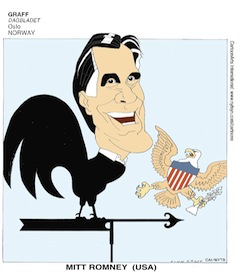“In the general election, I’ll be pointing out that the president took the reins of General Motors and Chrysler, closed factories, closed dealerships, laid off thousands and thousands of workers,” said Mr. Romney, a candidate for the Republican presidential nomination, on “CBS This Morning” on Jan. 11.
“He did it to try to save the business. We also had, on occasion, to do things that are tough to try to save
a business.”
My first thought was, didn’t Mr. Romney write an Op-Ed titled “Let Detroit Go Bankrupt?” Yes, he did. But the title was misleading. What he actually called for was a “managed bankruptcy,” with government support — not too different from what actually happened.
“A managed bankruptcy may be the only path to the fundamental restructuring the industry needs,” Mr. Romney wrote in The New York Times on Nov. 18, 2008. “It would permit the companies to shed excess labor, pension and real estate costs. The federal government should provide guarantees for post-bankruptcy financing and assure car buyers that their warranties are not at risk.”
So can Mr. Romney claim that he was for this successful policy all along? No, he can’t — because when the actual policy was proposed, he trashed it: “What is proposed is even worse than bankruptcy — it would make G.M. the living dead,” he wrote in a blog post on The National Review’s Web site on April 29, 2009.
So what the story of Mr. Romney and the auto bailout actually shows is something we already knew from health care: He’s a smart guy who is also a moral coward. His original proposal for the auto industry, like his health-care reform law in Massachusetts, bore considerable resemblance to what Mr. Obama actually did. But when the deed took place, Mr. Romney — rather than having the courage to say that the president was actually doing something reasonable — joined the rest of his party in whining and denouncing the plan.
And now he wants to claim credit for the very policy he trashed when it hung in the balance.
Truthout has licensed this content. It may not be reproduced by any other source and is not covered by our Creative Commons license.
Paul Krugman joined The New York Times in 1999 as a columnist on the Op-Ed page and continues as a professor of economics and international affairs at Princeton University. He was awarded the Nobel in economic science in 2008.
Mr Krugman is the author or editor of 20 books and more than 200 papers in professional journals and edited volumes, including “The Return of Depression Economics” (2008) and “The Conscience of a Liberal” (2007).
Copyright 2012 The New York Times.
UNTIL MIDNIGHT: All gifts to Truthout now matched!
Today all donations to Truthout will be matched dollar for dollar! Thanks to a generous supporter, your one-time gift today will be matched immediately. As well, your monthly donation will be matched for the whole first year, doubling your impact.
We have just one day left to reach our goals: raising $35,000 in one-time gifts and adding 450 new monthly donors.
This matching gift comes at a critical time. Trump has made it no secret that he is planning a demolition-style attack on both specific communities and democracy as a whole, beginning on his first day in office.
Help us prepare for Trump’s Day One, and have your donation matched today!
